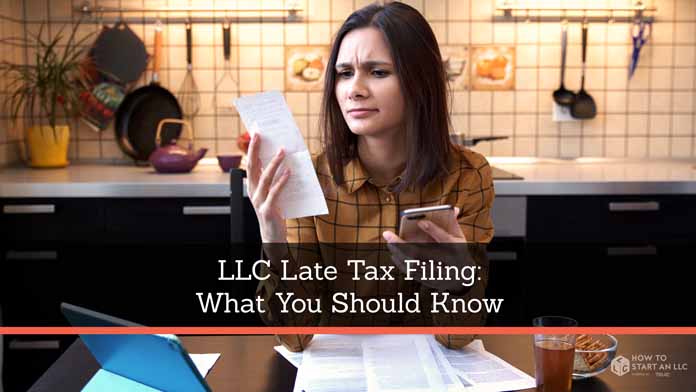LLC Late Tax Filing
Most businesses and individuals do not plan to file their taxes late, but with clerical errors, unexpected delays, or simply a lack of information, late filings do happen. This article will outline LLC filing deadlines to help keep you on track, and explain penalties and other implications of filing your taxes late if you do find yourself in this situation.

When Are My Federal Taxes Due?
The due date for your LLC’s federal taxes depends on how you choose to file. By default, LLCs are taxed like sole proprietorships or partnerships, depending on the number of members in your company. In this case, the business is considered a “pass-through” entity, and all profits and losses are reported on members’ personal tax returns. There is no corporate taxation, since the IRS does not recognize an LLC as a separate, taxable entity.
The deadline for filing personal income taxes is April 15 of each year. Additionally, since LLC members are considered self-employed by the IRS, taxes are not withheld throughout the year. For this reason, LLC members are required to make quarterly estimated tax payments by April 15, June 15, September 15, and January 15 to avoid a penalty.
LLCs also have the option to elect corporate status for tax purposes. They may choose to be taxed as either a C corp or an S corp. The deadline for filing your corporate tax return is March 15. While S corps are also considered pass-through entities, and not liable for corporate taxation, they must file IRS Form 2553 by March 15 to elect S corp status for the current tax year.
Shareholders of both C corps and S corps will be responsible for filing their personal tax returns by April 15. Keep in mind that shareholders of a C corp must report their dividend distributions on their personal return. LLC members taxed as partnerships or sole proprietorships will be responsible for self-employment taxes in addition to personal income tax.
Late Filing and Late Payment Penalties
The IRS imposes penalties for both failure to file your taxes and failure to pay your tax bill on time. If your LLC does not owe any taxes, there will be no fee for filing late no matter what filing status you choose.
For those companies that do owe taxes, the failure-to-file penalty is 5% of the unpaid taxes for each month or part of a month that a tax return is late. The total penalty will not exceed 25% of your unpaid taxes. If your return was over 60 days late, the minimum failure-to-file penalty is $210 (for taxes paid in 2019) or 100% of the tax required to be shown on the return, whichever amount is less.
If you file your tax return on time but do not pay the taxes owed, the IRS will assess a penalty of 0.5% of your unpaid taxes, not to exceed a total of 25% of the taxes owed. If both the late filing and late payment penalties apply, the maximum amount charged for the two penalties is 5% per month.
Not Paying Taxes is a Crime
While it’s important to take note of any late filing penalties you may be liable for, it’s even more critical to understand that not paying your LLC’s taxes is a crime. This means that beyond administrative fees, the federal government is within its rights to assess both civil and criminal penalties for failure to pay on time.
Requesting a Tax Extension
If you know you will not be able to file your LLC’s taxes on time, you have the option of filing for an extension by filling out form 4868. This extension will give you an extra six months to file. Once you’ve filed your extension, the same late penalties will apply when the extended period ends.
First Time Filing Late? You May Qualify for Penalty Abatement
While you should do everything in your power to file your tax return on time, if you do file late, the IRS is often lenient with first-time offenders. It has the discretion to offer relief if an LLC does not file its taxes on time for “reasonable cause.”


